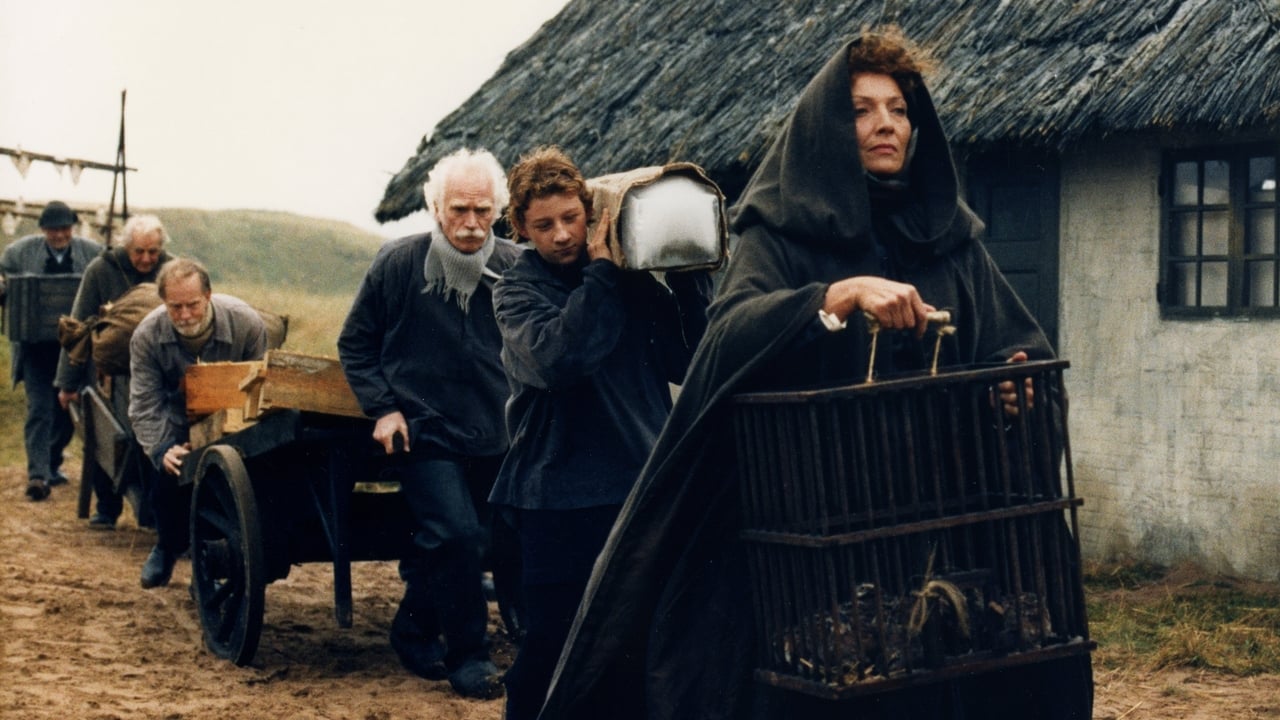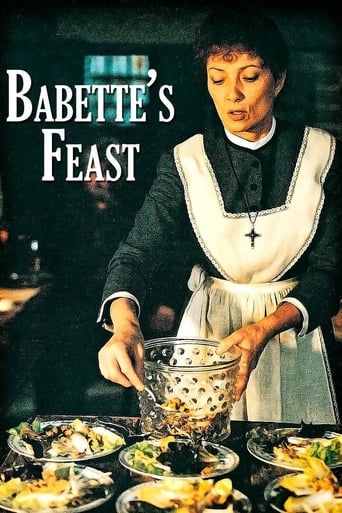

Better Late Then Never
... View MoreClever, believable, and super fun to watch. It totally has replay value.
... View MoreIt's the kind of movie you'll want to see a second time with someone who hasn't seen it yet, to remember what it was like to watch it for the first time.
... View MoreEach character in this movie — down to the smallest one — is an individual rather than a type, prone to spontaneous changes of mood and sometimes amusing outbursts of pettiness or ill humor.
... View MoreI remember grabbing this thing from the foreign film section at the local Blockbuster, seeing the accolades on the DVD cover, reading the captions on the back of the box, reading the plot summary, grinning, and then renting it.Well, "The French Lieutenant's Woman" it ain't. As like a lot of foreign films out of the 80s it was meant for a 40+ and older crowd. And not to sound too cliché nor to put to fine a point on it, but I got that. And yet when I watched it I was not drawn into the story in the least.The concept of how French cuisine can curb and soften the Danish religious moral fiber, to me, is boring in concept and execution. And boy did this film deliver on both.If you're going to make this kind of movie, and hope that accolades heaped on it will not be from a kind of incestuous older crowd of film critics, then you do need to *ahem* "spice up the film", so to speak (pun intended). Babette was not dynamic in the least. The villagers were cliché inbred small town types, only with European heritage. And the grand finale at the end was typical of so called high minded art for the masses (read that as poor story concept dressed up as finely shot film and fobbed off as great art). And when I saw the big buildup to the grand finale, I just stared at the screen with a cool level gaze, wondering how anybody raised the cash to shoot this thing.Breaking religious taboos with food is interesting on paper, but this is the kind of concept that needs a short made of it first so that it can be developed. Because as it stands now it's the proverbial boring foreign (French/Danish) film. And sure enough, when it was over, I think I popped in Star Trek II the Wrath of Kahn or possibly a Kurosawa samurai actioner. Babbette's cooking didn't agree with me.Shots of food being made, inane conversations between the characters, an amount of intrigue that simply is unbelievable about a single Gallic female cook, and of course, the actual meal itself whereupon religious notions and taboos are busted wide open (allegedly).Do your brain a favor and rent something else.
... View MoreA grandmother, I presume, narrates Babette's Feast with a fairytale-like presence and charm. It is old fashioned like that, based on the short story from Karen Blixen, and the two central sisters reflect this. Flashbacks establish their devout nature and piousness. Martine is courted by a young soldier, handsome and ambitious, who later becomes an important figure in the Queen's court. Philippa by a marvellously talented singer whom has become depressed by the constant travel and only wants to settle down. The scenes of their duet and how they engage in love songs are terribly romantic, except for Philippa's expression, clearly uncomfortable by even the mere lyrics and implied sinful notions they carry (although there is a suggestion that this might be significantly from her puritan perspective - otherwise how would Papin be so sure of sending them Babette?). They live up to their Protestant figurehead namesakes that their dear father/pastor must have lovingly bestowed them; Martin Luther King and Philipp Melanchthon. So even as they are beautiful as flowering fruit trees, as they are described, they refrain from falling in love, and plead their allegiance to their father's church. When Babette, a survivor of the Paris Commune, arrives, the church community thanks and praises God for sending them this gift so that the sisters may continue to spread the good work and tend to the flock. And like so many communities there is invariably discord - accusations of affairs, people cheating other's of their money, lies and dissatisfaction. They are not oblivious to this, but they push it out of their minds for more important, high-minded issues. When Babette declares she is making a French dinner with the works, they hesitantly approve, and then are tentative on the serving of wine. It is a gateway to sin, and Axel emphasises this with a green-tinged nightmare filled with grotesque, satanic imagery fit for Revelations; fiery visions of hell, animals rearing their ugly heads, and the spill of red wine like blood. The feast is the lengthiest segment of the film, and the best. Henning Kristiansen initially establishes the rural, puritan village with a desaturated palette devoid of any idyllic environmental imagery or tempting vices. This reinforces their way of life - bare and plain, like the food that Babette serves the sisters with whatever meagre groceries that she can haggle for. And then he introduces candlelight and lamp, briefly warm in their glow, to accompany the feast. But he does not ramp this up to food porn levels - the ingredients are not exotic splashes of colour to bring life into the lives of the village - that change must come from within. The only out of place shot is the one immediately after the cathartic meal, the almost storybook scene of the endlessly beautiful starry night that looks upon their dance and song. This seems deliberately so, as if to over-highlight a new outlook on life. What many have not touched on is how funny Babette's Feast can be. The villagers all agree to shut out out temptations and refuse to comment on the food, no matter how good it is. The only one that is from a different perspective is Lorens, who has the expertise and freedom to do so. And he does too, marvelling at each course and dish and lavishing the flavours and combinations. The humour comes from the other dinner guests, who most evidently feel the same way about the food as he does, but do not want to admit it. Instead they chime awkwardly in with religious recitations that fall on deaf ears and gross, offended looks at the sinful gluttony that is occurring right beside them. The food continues to be served (in a way that is reminiscent of Big Night, and how the courses overwhelm the guests) and there is a slow epiphany. Old feuds are forgiven and forgotten, lost love is rekindled. The film is not anti-religious in any way, but serves up a tale that is able to rouse even the most pious to slurp and suck every last drop and swallow every last bite with relish. Babette may have nothing left, but ironically it is her that has gained and dished out the spiritual fulfilment, and they are all full, and so is the audience.
... View MoreIn a remote 19th Danish century village two sisters lead a rigid life centered around their father, the local minister, and their church. Both had opportunities to leave the village: one could have married a young army officer and the other, a French opera singer.Upon its release in 1987, "Babette's Feast" received overwhelmingly positive reviews. The film won the 1987 Best Foreign Language Film at the Academy Awards. It also received the BAFTA Film Award for Best Film Not in the English Language. In Denmark, it won both the Bodil and Robert awards for Best Danish Film of the Year. The film was nominated and/or won several other awards including a Golden Globe nomination, the Grand Prix (Belgian Film Critics Association) award and a Cannes Film Festival special prize.Pope Francis identified "Babette's Feast" as his favorite film. Of all the films out there, this is the one he picked. After the film's release, several restaurants offered recreations of the film's menu. In "The Archers", Jennifer Aldridge hosted a party to celebrate the installation of her new kitchen where the food was inspired by "Babette's Feast".This really is the finest example of modern Danish cinema. We tend to think of Scandinavia as a dark, sad place... few directors are really known internationally from there, besides perhaps Bergman and Dreyer. Today, of course, we have von Trier, but it seems that "Babette's Feast" must have opened a few doors.
... View MoreA tribute to the late Danish director Gabriel Axel, BABETTE'S FEAST is the paramount legacy left by him to us, an Academy BEST FOREIGN LANGUAGE PICTURE winner, a chant implies us what gustation could evoke a religious epiphany. It is a ritually ceremonious fare renders us warmth and serenity without the customary sanctimony or doctrinaire preaching, a crowd-pleaser dauntingly satiates the audience's aesthetics irrespective of their religious disparities. A dour and self-sacrificing manner of living in an isolated village, Flippa (Kjer) and Martine (Federspiel) are two spinster sisters adhere to the holy cause of their late father (Kern), sermonize local believers. Narrated by a poised and tranquilizing voice-over, through Flippa and Martine's episodic and never-fully-blossomed romance with two gentlemen in their youth, not only we witness their tested devotedness to the conviction, but also it gently sets the context for the arrival of Babette (Audran), a French fugitive seeks for refugee during the wartime, who voluntarily serves the sisters as a housemaid, until she wins a lottery and decides to prepare a genuine French feast for the sisters and their followers, who are dumbfounded at the sheer exotic and exquisite banquet, and the comical and scintillating vibes of their apprehension towards the unknown treat and protean reactions after savoring each course are depicted in a self-effacing but divinely innocuous mode. We might not all enthusiasts of French cuisine, however, the contradiction can never be more wisely enjoyable. The performances are rigidly rehearsed, a mite of histrionics but overall, there are nothing but amiable characters, Audran imbues a underplayed enactment of a woman afflicted by the most atrocious trauma, but hides them all under her worldly facade, even in a foreign country, she spunkily embraces her life without compromise. Kjer and Federspiel pair up harmoniously in their saint-like personae, embody all the virtues with compelling grace and benevolence. Jarl Kulle uniformly eloquent as Gen. Lorens Löwenhielm, a true gourmet guides the devotees into an emulating farce of a viscerally gustatory escapade, and the real-life baritone Jean-Philippe Lafont imprints a gleeful tonality as a maestro stumbles on a hidden gem which contritely he can never possess. It is simply a winsome bucolic prose with minimal adornment, encompassed with pictorial shots of rural scenery, still-life scrutiny and rigorous portrayal, enchants us with empyrean hymns, but emotionally BABETTE'S FEAST is immensely opulent, an ethereal fable oozes humanity and compassion can feasibly strike a chord in any heart with perspicacious pulsation, RIP Gabriel Axel, may thou will be feted with a feast in heaven too.
... View More